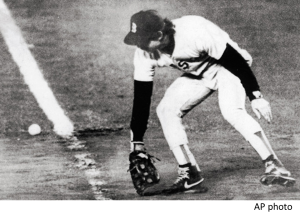Writing it down
 The Internet is full of idioms and expressions that people get wrong. Popular examples include I could care less, for all intensive purposes, and take it for granite. In most cases, the speaker is just being careless.
The Internet is full of idioms and expressions that people get wrong. Popular examples include I could care less, for all intensive purposes, and take it for granite. In most cases, the speaker is just being careless.
Speech evaporates as soon as the words are spoken, understood, and replaced with more speech. But the act of writing it down imposes additional requirements.
You’re now held accountable for proper spelling and, most of all, sense. Readers can read it again. They can copy it and share it with others. If it doesn’t make sense, they might even have a good laugh.
In the olden days, when published works guaranteed at least some minimum level of editing, silly errors were rare. Books, magazines, and newspapers used professional writers and editors. We learned to write well by reading well-written material. But with the advent of Internet news sources and e-zines, young readers have a virtual landfill of bad writing at their – uh – disposal.
Here are three recent examples from “professionally” written online articles:
Hard to believe in this stay and age ….
The writer means in this day and age, and it’s possible that someone could misunderstand that if it were spoken. But do people even read what they write? It makes no sense at all.
It’s good to exercise regularly, but don’t overdue it ….
Exercise is something you shouldn’t overdo, but overdue is more suited to bills and library books. You see, children, once upon a time they had buildings full of actual books you could borrow, and you were supposed to return them by a certain … oh, never mind.
We expected a live performance, but all she did was lip-sing…
Allowing for the fact that it’s hard to sing without using your lips, this writer meant the performer only pretended to sing by synchronizing her lip movements with a recording. Spelled lip-synch or lip-sync, but not lip-sing.
Technology now allows us to publish our thoughts instantly. Without verification, editing, or even review. Autocorrect steps in and changes words we don’t want changed. Our fingers hit neighboring keys and we make embarrassing typos. The least we can do is try to produce the best first effort, then review. Double-check. Look things up.
It’s great when a piece of writing goes viral and thousands of readers see it. Not so great when your name is forever associated with a blunder.
Just ask Bill Buckner (1986 World Series, Game 6).
Like TextCPR on Facebook!



